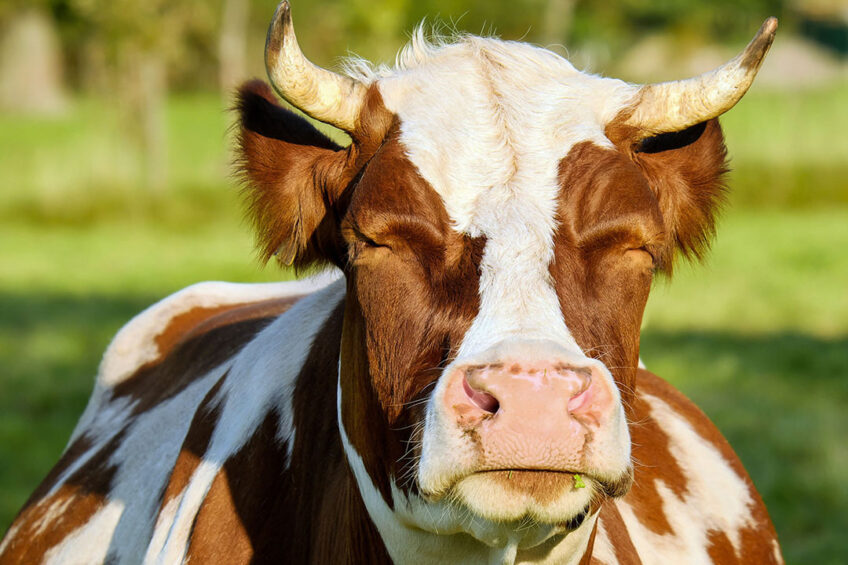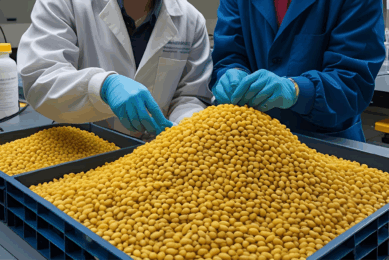Oilseed by-products: A sustainable protein source for ruminants

Growing global population, increased demand for animal-source food, along with unsustainable consumption behaviours enhance the interest in finding alternative protein sources to substitute soybean meal in ruminants’ nutrition.
Many by-products containing high volumes of nutrients and bioactive compounds with various health benefits are produced and discarded every year from the food industry. Oilseed by-products including cold-pressed oilseed cakes represent a good alternative protein source to cover the increasing global demand of protein foods.
Cold-pressed oilseed cakes
Oilseed includes rapeseed, canola, sunflower, linseed, camelina, coconut, cotton, pumpkin, and hempseed. Oilseed press cakes are the by-products remaining after the removal of the greater part of the oil from oilseeds using a mechanical press method. Mechanical pressing without using heat results in cold-pressed oilseed cakes which is a cheap, easy, and rapid process to obtain cakes from small quantities of raw materials. Cold-pressed oilseed cakes are rich in fibre, residual oils, and essential fatty acids, but contain lower protein levels than conventionally solvent-extracted meals.
Impact on digestion and growth performance
Sunflower cold-pressed cakes: In beef cattle, alter microbial rumen fermentation pattern towards lower acetate and higher propionate proportion, reduce total volatile fatty acids and methane production, and decrease dry matter, organic matter, crude protein, neutral detergent fibre, and acid-detergent fibre disappearances.
Rapeseed cold-pressed cakes: Decrease total saturated fatty acids in rumen effluent and increase the content of vaccenic acid.
Hempseed cold-pressed cakes: The intestinal digestibility of protein in hempseed cold-pressed cakes is remarkably low, making it a poor protein supplement.
Camelina cold-pressed cakes: Is a superior protein source to sunflower meal or copra meal due to high content of rumen degradable protein, and high organic matter digestibility.
Rapeseed, hempseed, and camelina cold-pressed cakes in steers, heifers, and lamb diets have no detrimental effects on growth performance which opens new opportunities for their use. Dry matter intake increases in calves fed hempseed cold-pressed cakes compared to soybean meal.
Impact on milk production
Supplementing rapeseed, hempseed, and linseed cold-pressed cakes increases milk yield in cows.
However, replacing heat-moisture-treated rapeseed with linseed cold-pressed cakes in a grass silage-based diet decreases milk production due to slightly higher lipid content of linseed, differences in fatty acid composition and amino acid profile, more extensive ruminal degradability of linseed, and antinutritional factors contained in linseed.
Diet supplemented with camelina cold-pressed cakes decreases milk yield in cows.
Inclusion of hempseed cold-pressed cakes improves sheep milk yield, and supplementing linseed cold-pressed cakes increases goat milk production.
Adding cold-pressed oilseed cakes decreases milk protein content in dairy cows due to the dilution effect.
Inclusion of cold-pressed oilseed cakes in dairy cow diets enhances the incidence of diet-induced milk fat depression.
Impact on fatty acid profile of milk
Inclusion of cold-pressed oilseed cakes affects the ruminal biohydrogenation process and alters fatty acid profile of milk.
Supplementing rapeseed, linseed, and camelina cold-pressed cakes decreases saturated and unsaturated fatty acid content in cow’s milk.
Gradual replacement of heat-moisture-treated rapeseed with linseed increases saturated fatty acid in cow’s milk.
Cow diet supplemented with rapeseed, linseed, sunflower, and camelina cold-pressed cakes increase conjugated linolenic acid and vaccenic acid in milk.
Linseed and pumpkin seed cold-pressed cakes increase conjugated linolenic acid and vaccenic acid in goat milk.
Hempseed is a natural antioxidant preventing lipid oxidation in raw milk and supplementing diet with hempseed cold-pressed cakes increase the content of α-tocopherol in sheep milk.
Impact on fatty acid profile of meat
Inclusion of 30% rapeseed cold-pressed cakes in both growing and finishing cow diets increase polyunsaturated fatty acids and conjugated linolenic acid in meat.
Inclusion of hempseed cold-pressed cakes improves fatty acid profile in the muscle longissimus dorsi in terms of increased content of conjugated linolenic acid, vaccenic acid, and monounsaturated fatty acids. Supplementing lamb diet with hempseed cold-pressed cakes increases polyunsaturated fatty acids content of the meat.
Concluding remarks
Cold-pressed oilseed cakes, comprising a large quantity of oil industry by-products, are promising sustainable feed ingredients that can substitute conventionally used protein sources in ruminant nutrition. However, antinutritional compounds can limit feed intake and nutrient utilisation, thus restricting the inclusion of cold-pressed oilseed cakes in feed formulations. Further research is required to establish the acceptable dietary supplementation level of cold-pressed oilseed cakes without any adverse effects on livestock.
Review: “Cold-Pressed Oilseed Cakes as Alternative and Sustainable Feed Ingredients” – Published in MDPI











